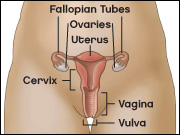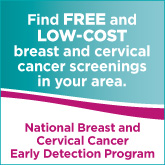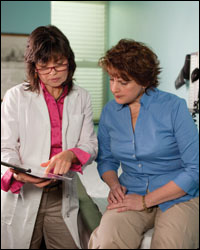Inside Knowledge About Gynecologic Cancer
 Get the facts about the signs, symptoms, and risk factors of gynecologic cancers. When gynecologic cancers are found early, treatment is most effective.
Get the facts about the signs, symptoms, and risk factors of gynecologic cancers. When gynecologic cancers are found early, treatment is most effective.
Gynecologic cancers are cancers that start in a woman's reproductive organs. The five main types are—
 Each gynecologic cancer is unique, with different signs, symptoms, risk factors (things that may increase your chance of getting a disease), and prevention strategies. Every year, more than 80,000 women in the U.S. are told they have a gynecologic cancer, and more than 25,000 women die from a gynecologic cancer.*
Each gynecologic cancer is unique, with different signs, symptoms, risk factors (things that may increase your chance of getting a disease), and prevention strategies. Every year, more than 80,000 women in the U.S. are told they have a gynecologic cancer, and more than 25,000 women die from a gynecologic cancer.*
*Source: U.S. Cancer Statistics Working Group. United States Cancer Statistics: 1999–2008 Incidence and Mortality Web-based Report. Atlanta (GA): Department of Health and Human Services, Centers for Disease Control and Prevention, and National Cancer Institute; 2012. Available at: http://www.cdc.gov/uscs.
Symptoms
 All women are at risk for gynecologic cancers, and risk increases with age. There is no way to know which women will get a gynecologic cancer. That's why it is important to pay attention to your body and know what's normal for you, so you can recognize the warning signs or symptoms of gynecologic cancer.
All women are at risk for gynecologic cancers, and risk increases with age. There is no way to know which women will get a gynecologic cancer. That's why it is important to pay attention to your body and know what's normal for you, so you can recognize the warning signs or symptoms of gynecologic cancer.
If you notice any unexplained signs or symptoms that last for two weeks or longer, talk to your doctor, nurse, or other health care provider. Symptoms may be caused by something other than cancer, but the only way to know for certain is to see a health care provider.
Prevention and Screening
Some gynecologic cancers are caused by human papillomavirus (HPV), a very common sexually transmitted infection. A vaccine protects against the HPV types that most often cause cervical, vaginal, and vulvar cancers. While it is recommended for 11- and 12-year-old girls, the vaccine can be given to girls beginning at age 9. Ideally, girls should get three doses of this vaccine before their first sexual contact. It also can be given to girls and women who are 13–26 years old who did not get any or all of the shots when they were younger. If you or someone you care about is in this age range, talk with a doctor about it. (The HPV vaccine also is recommended for boys and young men.)
 Of all the gynecologic cancers, the only cancer for which screening is recommended is cervical. The Pap test screens for cervical cancer and can find it early, when treatment can be most effective. The Pap test also helps prevent cervical cancer by finding precancers, cell changes on the cervix that might become cervical cancer if they are not treated appropriately.
Of all the gynecologic cancers, the only cancer for which screening is recommended is cervical. The Pap test screens for cervical cancer and can find it early, when treatment can be most effective. The Pap test also helps prevent cervical cancer by finding precancers, cell changes on the cervix that might become cervical cancer if they are not treated appropriately.
In addition to the Pap test—the main screening test for cervical cancer—a test called the HPV test looks for HPV infection. It may be used to screen women aged 30 years and older, or for women of any age who have unclear Pap test results. Learn more about the Pap and HPV tests.
The Pap test only checks for cervical cancer. It does not check for ovarian, uterine, vaginal, or vulvar cancers.
Since there is no simple and reliable way to screen for any gynecologic cancer except cervical cancer, it is especially important for women to pay attention to their bodies, so they can recognize warning signs. Talk with your doctor if you believe that you may be at increased risk for gynecologic cancer. Ask what you might do to lower your risk and whether there are tests that you should have.
Treatment
If your doctor says that you have a gynecologic cancer, ask to be referred to a gynecologic oncologist—a doctor especially trained to treat cancers of a woman's reproductive system. This doctor will work with you to create a treatment plan.
Inside Knowledge: Get the Facts About Gynecologic Cancer Campaign
 CDC, in collaboration with the Department of Health and Human Services' Office on Women's Health, established the Inside Knowledge: Get the Facts About Gynecologic Cancer campaign to raise awareness about the five main types of gynecologic cancer: cervical, ovarian, uterine, vaginal, and vulvar.
CDC, in collaboration with the Department of Health and Human Services' Office on Women's Health, established the Inside Knowledge: Get the Facts About Gynecologic Cancer campaign to raise awareness about the five main types of gynecologic cancer: cervical, ovarian, uterine, vaginal, and vulvar.
Developed and implemented by CDC's Division of Cancer Prevention and Control, the campaign—
- Provides information about gynecologic cancers.
- Produces and disseminates educational materials in English and Spanish.
- Educates women and health care providers about the signs and symptoms of gynecologic cancers, screening tests (if available), risk factors, and prevention strategies.
Inside Knowledge resources for women include—
- A comprehensive brochure [PDF-3.5MB] about gynecologic cancer in general.
- Fact sheets about the five main types of gynecologic cancer (cervical, [PDF - 1.4MB] ovarian, [PDF - 1.7MB] uterine, [PDF - 2.2MB] vaginal, and vulvar [PDF - 1.5MB] cancers).
- A symptoms diary, [PDF-503KB] including a symptoms matrix and a place for women to note symptoms that may be related to a gynecologic cancer.
- Posters.
- Print public service announcements (PSAs).
- Radio PSAs.
- Television PSAs.
More Information
- Gynecologic Cancers
- HPV Vaccine
- Human Papillomavirus (HPV)-Associated Cancers
- Free or Low-Cost Pap Tests
- Cánceres ginecológicos (Spanish)
Podcasts
Health-e-Cards
CDC works 24/7 saving lives and protecting people from health threats to have a more secure nation. A US federal agency, CDC helps make the healthy choice the easy choice by putting science and prevention into action. CDC works to help people live longer, healthier and more productive lives.
Get email updates
To receive email updates about this page, enter your email address:
Contact Us:
- Centers for Disease Control and Prevention
1600 Clifton Rd
Atlanta, GA 30333 - 800-CDC-INFO
(800-232-4636)
TTY: (888) 232-6348 - cdcinfo@cdc.gov






